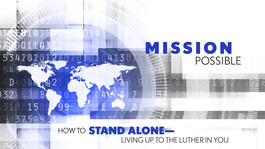Mission Possible
What We Can Learn from Ben Carson, Evangelicals and America
Speaker
Dwight K. NelsonSince 1983, Dwight Nelson has served as lead pastor of the Pioneer Memorial Church on the campus of Andrews University. He preaches on the “New Perceptions” telecast, teaches at the theological seminary and has written some books, including The Chosen. He and his wife, Karen, are blessed with two married children and 2 granddaughters.
Offering
More In This Series
“Mission Possible:
What We Can Learn from Ben Carson, Evangelicals and America”
- Ben Carson
- North American Division of Seventh-day Adventists (May, 2015): “As the 2016 United States election cycle begins, the Seventh-day Adventist Church is aware of the increased interest in the presidential candidacy of Dr. Ben Carson. Dr. Carson’s story is well known to most Adventists, and he is a well-respected physician. The Adventist Church has a longstanding position of not supporting or opposing any candidate for elected office. This position is based both on our historical position of separation of church and state and the applicable federal law relating to the church’s tax-exempt status. While individual church members are free to support or oppose any candidate for office as they see fit, it is crucial that the church as an institution remain neutral on all candidates for office. Care should be taken that the pulpit and all church property remain a neutral space when it comes to elections.” (http://spectrummagazine.org/article/2015/05/04/adventist-church-issues-statement-ben-carsons-candidacy)
- Evangelicals
- George Barna: Evangelicals (1) have made a personal commitment to Christ (“born again”), (2) believe that by faith in Him they will be in heaven one day, (3) say their faith is very important in their life today, (4) believe they have a personal responsibility to share their religious beliefs about Christ with non-Christians, (5) believe that Satan exists, (6) believe that eternal salvation is possible only through grace, not works, (7) believe that Jesus Christ lived a sinless life on earth, (8) assert that the Bible is accurate in all the principles it teaches, and (9) describe God as the all-knowing, all-powerful, perfect deity who created the universe and still rules it today. (https://www.barna.org/barna-update/faith-spirituality/648-is-evangelism-going-out-of-style#.Vjt4i7erTDc)
- Proverbs 14:34 NLT—“Godliness exalts a nation, but sin is a disgrace to any people.”
- Proverbs 16:12; 20:28
- Daniel 2:21; 4:25, 27; 5:27; 6:25; 7:26,27; 10:13; 11:36,45
- And Us
- Isaac Kramnick and R. Laurence Moore: “People attacked [Roger] Williams as a radical, a ‘church-ruinating’ anarchist, for laying the ideological foundation for a society that takes religion seriously but constructs a state without reference to any religious claims. Such a society is not secular, if by that we mean that religion plays no role in public life. Its politics, however, is godless, and so, in their official functions, are its politicians. Williams reached his conclusions about the urgent need to separate church and state, not because he did not care about the future of Christianity, but because he sometimes appeared to care about nothing else. Williams’s main concern was always the purity of the church.” (The Godless Constitution: The Case Against Religious Correctness 52)
- “No one who cares about civil peace would deny that morality is important. . . . The dispute is rather between those who argue that the content of morality is itself a question for public debate and those who argue that morality is an issue already settled by the religious views of the purported majority. To the latter, if public officials don’t profess religion, if they don’t make a link between proper citizenship and churchgoing, if they don’t see to it that schoolchildren pray, then the country is on its way to hell.” (Ibid 64)
- Great Controversy: “[The Pilgrims] patiently endured the privations of the wilderness, watering the tree of liberty with their tears, and with the sweat of their brow, till it took deep root in the land. The Bible was held as the foundation of faith, the source of wisdom, and the charter of liberty. The Bible was held as the foundation of faith, the source of wisdom, and the charter of liberty.” (296)
- “[The Bible’s] principles were diligently taught in the home, in the school, and in the church, and its fruits were manifest in thrift, intelligence, purity, and temperance. . . . It was demonstrated that the principles of the Bible are the surest safeguards of national greatness. The feeble and isolated colonies grew to a confederation of powerful states, and the world marked with wonder the peace and prosperity of ‘a church without a pope, and a state without a king.’” (Ibid emphasis supplied)
- Ellen White to A. T. Jones April 9, 1893: “Dear Brother, There is a subject which greatly troubles my mind. While I do not see the justice nor right in enforcing by law the bringing the Bible to be read in the public schools: yet there are some things which burden my mind in regard to our people making prominent their ideas on this point. These things I am sure will place us in a wrong light before the world.” “If such a law were to go into effect the Lord would overrule it for good, that an argument should be placed in the hands of those who keep the Sabbath, in their favor, to stand on the Bible foundation in reference to the Sabbath of the fourth commandment. . . . My brother, this objecting to the passing of a law to bring the Bible into the schools will work against us . . . who are making so much of the Bible.” (The Ellen G. White 1888 Materials 1164)
- 1 Peter 3:13—“Who is going to harm you, if you are eager to do good?”
When you seek common good,
you share common ground.


